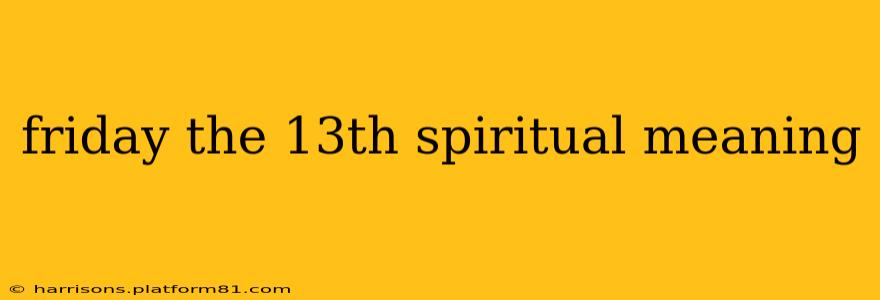Friday the 13th. The very phrase conjures images of black cats, broken mirrors, and a general sense of impending doom. But what's the real story behind this pervasive superstition? While many dismiss it as mere folklore, exploring its origins and varied interpretations reveals a surprisingly rich tapestry of spiritual and symbolic meanings. This exploration delves into the historical roots, cultural perspectives, and psychological underpinnings of this intriguing phenomenon.
Why is Friday the 13th considered unlucky?
The origins of Friday the 13th's negative connotation are complex and interwoven with various historical and cultural factors. One significant influence is the Christian faith. The number 13 has long been associated with betrayal and misfortune due to the presence of 13 guests at the Last Supper, culminating in the betrayal of Jesus by Judas. Friday, in Christian tradition, is the day of Jesus' crucifixion, further reinforcing the day's association with suffering and death.
However, the fear of Friday the 13th wasn't universally adopted across all cultures. Its prominence in Western culture, particularly in the United States, has grown significantly over the centuries, fueled by both historical associations and the power of suggestion.
What are the different cultural perspectives on Friday the 13th?
The fear of Friday the 13th, known as paraskevidekatriaphobia, isn't uniformly experienced across the globe. Some cultures view Friday as an auspicious day, while others find the number 13 unlucky, unrelated to its pairing with Friday. In Italian culture, for example, the number 17 is considered unlucky, highlighting the diverse ways in which numerical superstitions manifest. Understanding these varied interpretations adds complexity to a seemingly straightforward phobia.
Is Friday the 13th a real phenomenon or just superstition?
Whether Friday the 13th is a "real" phenomenon depends on your perspective. From a purely scientific standpoint, there's no evidence to suggest that this day is inherently more dangerous or unlucky than any other day. However, the power of suggestion and the collective belief in this superstition can impact people's behavior. The expectation of misfortune can lead to increased anxiety and heightened awareness of negative events, creating a self-fulfilling prophecy.
Does Friday the 13th have any spiritual significance?
The spiritual significance of Friday the 13th is largely tied to the symbolic interpretations of both the number 13 and the day Friday. The number 13 itself is often viewed as a symbol of chaos or disruption in numerology, and when paired with Friday's negative associations in Christian tradition, it amplifies the sense of impending misfortune. Some spiritual practices interpret the day as a time of heightened sensitivity or a period for introspection, prompting reflection on patterns and behaviors. However, these interpretations vary widely depending on individual beliefs and spiritual systems.
How can I overcome my fear of Friday the 13th?
If you find yourself experiencing anxiety surrounding Friday the 13th, understanding the origins and psychological underpinnings of the fear can be a powerful first step. Rationalizing the superstition and acknowledging the lack of empirical evidence can significantly reduce anxiety. Techniques such as mindfulness, positive self-talk, and exposure therapy can also be helpful in mitigating the fear. Recognizing that your feelings are driven by a culturally ingrained belief rather than objective reality is key to managing your anxiety.
Are there any rituals or practices associated with Friday the 13th?
While there aren't widely recognized "official" rituals associated with Friday the 13th, many individuals engage in practices meant to ward off bad luck or invite good fortune. These often range from carrying lucky charms to avoiding certain activities. These actions highlight the way superstitions, even those based on fear, influence behaviors and provide a sense of control over an unpredictable world.
In conclusion, the spiritual meaning of Friday the 13th is multifaceted and depends significantly on individual perspectives and cultural backgrounds. While the fear itself is largely rooted in superstition, its enduring presence showcases the potent influence of collective belief and the human need to interpret and make sense of the world around us. By understanding its origins and psychological impact, we can navigate this "unlucky" day with a greater sense of awareness and control.
